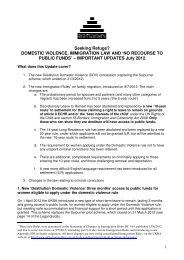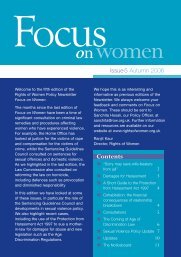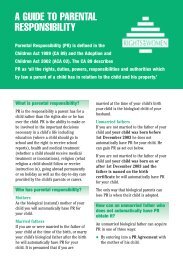Seeking Refuge? - Rights of Women
Seeking Refuge? - Rights of Women
Seeking Refuge? - Rights of Women
You also want an ePaper? Increase the reach of your titles
YUMPU automatically turns print PDFs into web optimized ePapers that Google loves.
Depending on your financial circumstances<br />
and the merits <strong>of</strong> your case, you may be<br />
entitled to public funding (also known as<br />
legal aid). Public funding enables some<br />
people who cannot afford to pay privately to<br />
get legal advice and representation free <strong>of</strong><br />
charge. However, not all legal representatives<br />
do publicly-funded work and there are limits<br />
on the work that a publicly-funded legal<br />
representative can do on a case. For further<br />
information about public funding and getting<br />
legal advice, talk to your legal representative<br />
or contact Community Legal Advice<br />
www.communitylegaladvice.org.uk<br />
If you are not entitled to public funding, you<br />
may have to pay for legal advice or, if you<br />
cannot afford this, represent yourself.<br />
On the day you arrive in detention, or the next<br />
day, you will be given time to see your legal<br />
representative. It is important to give your legal<br />
representative as much information about yourself<br />
and your case as you can. This information will<br />
help them present your case. For information<br />
about the law that determines whether or not a<br />
person can remain in the UK, see Chapter 2.<br />
It is also important to tell your legal representative<br />
about any torture or harm you have suffered and<br />
any health issues that you have (see above), as<br />
this may enable them to challenge the decision to<br />
detain you, and help get you released.<br />
The asylum interview<br />
The asylum interview is a very important part <strong>of</strong> the<br />
process in deciding your application for asylum. For<br />
information about the interview and the evidence<br />
that may be provided to a case-owner to help them<br />
make a decision, see Chapter 5.<br />
Decision<br />
After the interview, the case-owner will examine<br />
all the information and evidence you and your<br />
legal representative have put forward and decide<br />
whether or not you should be given protection in<br />
the UK.<br />
What happens if I need more<br />
time to prepare my case?<br />
Flexibility in the fast-track<br />
One <strong>of</strong> the concerns about the detained fast-track<br />
is the speed with which decisions are taken. Many<br />
lawyers and others have argued that cases are<br />
dealt with too quickly for a fair decision to be<br />
taken. Consequently, to try to ensure that people<br />
in detention have their case dealt with fairly, a<br />
flexibility policy was introduced to set out in what<br />
circumstances the timetable for dealing with cases<br />
should be changed.<br />
The policy is the Detained fast-track<br />
processes (2005). You can download a<br />
copy from the UK Border Agency website<br />
at:<br />
www.ind.home<strong>of</strong>fice.gov.uk/sitecontent/<br />
documents/policyandlaw/asylumprocess<br />
guidance/detention/<br />
The policy states that a case should be taken out<br />
<strong>of</strong> the detained fast-track where the short time<br />
given to prepare and present a case means that a<br />
decision cannot be reached fairly. The language<br />
used by the policy is “with a requisite degree <strong>of</strong><br />
fairness”. This means that, if you think that you<br />
do not have enough time to prepare or present<br />
your case, you should tell your legal representative<br />
and case-owner. Your legal representative can<br />
take legal steps to try to get you released from<br />
detention.<br />
The policy also sets out a number <strong>of</strong> factors that<br />
should lead a case-owner to either vary the<br />
timetable or take your case out <strong>of</strong> the fast-track.<br />
Your case should be taken out <strong>of</strong> the fast-track<br />
where:<br />
• complicated issues emerge that cannot be dealt<br />
with on the fast-track timetable. For example,<br />
where an expert report is needed on your country<br />
and you need time to find an expert to prepare it.<br />
The fast-track timetable should be changed to<br />
give you more time where:<br />
• You say that you are unwell and do not want<br />
to continue with an interview. The interview<br />
should be delayed and you should be given<br />
medical attention.<br />
15<br />
Statutory instrument 238/2001, the rules are made pursuant to section 153 <strong>of</strong> the Immigration and Asylum Act 1999 and<br />
came into effect on 2nd April 2001 see http://www.opsi.gov.uk/SI/si2001/20010238.htm for further information.<br />
16<br />
PB [2008] EWHC 364 (Admin)<br />
29
















